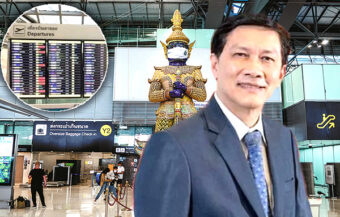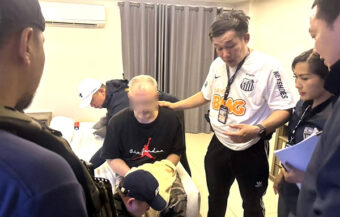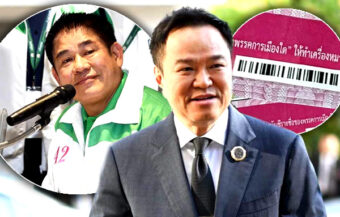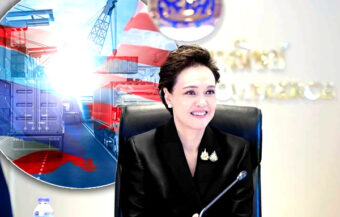Former PM Abhisit Vejjajiva returns as Democrat Party leader, warmly welcomed by ex-Pheu Thai chief Dr. Cholnan Srikaew, promising democratic reform, youth engagement, and renewed credibility ahead of Thailand’s tense political scene and the 2026 general election.
Dr. Cholnan Srikaew of the Pheu Thai Party on Saturday welcomed Abhisit Vejjajiva’s return as leader of Thailand’s oldest party. The Oxford-educated, dual British-Thai former prime minister now re-emerges as a voice for democratic governance. His comeback comes amid political upheaval, with a general election expected in March 2026. Meanwhile, youth-led progressive politics and conservative parties allied with Prime Minister Anutin Charnvirakul are reshaping the political landscape.
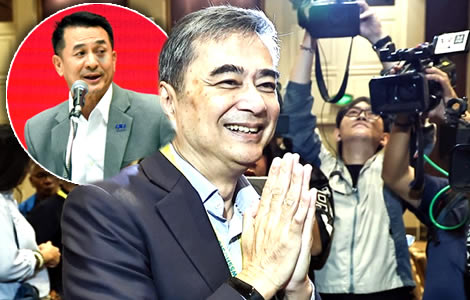
Dr. Cholnan Srikaew, a senior Pheu Thai Party figure and former opposition leader, has warmly welcomed the return of former Prime Minister Abhisit Vejjajiva to the leadership of the Democrat Party. Speaking on Saturday, October 18, 2025, Dr. Cholnan described Abhisit’s unopposed election as a “positive and stabilising” development for Thailand’s political scene.
He said Abhisit’s comeback brought both reassurance and credibility to a political system often marred by fragmentation. “Abhisit has knowledge, ability, and good intentions,” Dr. Cholnan said. “Having someone of his experience and moral grounding return to the forefront is good for the country.”
According to Dr. Cholnan, the Democrat Party’s oldest rival, Pheu Thai, views the event as a moment of potential cooperation rather than confrontation.
Dr Cholnan Srikaew says Abhisit return may foster cooperation and strengthen democracy
He noted that both major parties share a renewed interest in strengthening Thailand’s democratic institutions after years of instability. “Our country needs political maturity,” he said. “If the Democrats and Pheu Thai can uphold democratic principles, Thailand will be the real winner.”
However, he also cautioned that politics in Thailand has changed dramatically. Younger voters, he said, are more informed, assertive, and digitally connected. “The true challenge,” he added, “is whether an old and respected party can adapt to a new generation’s expectations.”
Abhisit, who first led the Democrats two decades ago and served as Thailand’s 27th Prime Minister, was re-elected party leader without competition during an extraordinary general meeting at the Miracle Grand Convention Hotel in Bangkok’s Lak Si District.
The vote was decisive. He received 96.18% support from members and delegates — a show of confidence that ended with thunderous applause and chants of “Welcome home!” echoing through the conference hall.
Overwhelming party support shows Abhisit retains strong influence and backing among party members
The event, attended by MPs, former ministers, and veteran party figures, marked a pivotal moment for Thailand’s oldest political party. For the first time in years, the Democrats projected unity and purpose.
When reporters asked how it felt to return after years away from active leadership, Abhisit smiled. “My heart has never left,” he said. That phrase, repeated several times during the morning, became the unofficial slogan of his comeback.
The 61-year-old leader, who holds both Thai and British citizenship, acknowledged that time was short before the next general election, tentatively scheduled for March 29, 2026. Nevertheless, he promised to rebuild the party’s credibility and reconnect with voters. “We have a lot of work to do,” he said. “But if we combine new energy with old experience, the Democrat Party can rise again.”
He said that since rejoining the political front line, he had devoted most of his time to recruiting new members, especially younger professionals and digital entrepreneurs. “I’ve spent months convincing new people to join us,” he explained. “I want to see more young faces. I’d like to be the only one with white hair in the room.”
Abhisit emphasises youth recruitment and blending new energy with experience to rebuild the Democrat Party
During the meeting, Abhisit unveiled his new executive team, introducing eight deputy leaders with clearly defined missions. The list reflected both continuity and change. Korn Chatikavanij, a seasoned economic strategist, was placed in charge of policy.
Karndee Leowpairoj, a digital economy expert, will oversee innovation and technology. Juri Numkaew will handle corporate communications, while Ratklao Intawong Suwannakiri will lead initiatives on women, youth, and sustainability.
The remaining four deputies were Wiraphong Prapa, responsible for international economic affairs; Sathit Wongnongtoey, charged with political strategy and coordination with the public sector; Issara Sunthonwat, overseeing foreign affairs; and Amporn Phinasa, directing education policy. Chaiwat Bannawat was named as the new party secretary.
Abhisit explained that the appointments were carefully balanced to merge experience with new energy. “This team shows we are not only looking backwards,” he said. “We are building for the future.”
Abhisit admits challenge ahead as Democrat Party seeks to regain urban support and adapt to new voters
He admitted, however, that the task ahead was formidable. The Democrat Party has endured years of decline, battered by electoral defeats and a shrinking urban base. Once dominant in Bangkok and the South, the party has steadily lost ground to new movements appealing to younger and more progressive voters.
Observers say the Democrats’ revival now depends on whether Abhisit can rebrand them as a modern, reform-minded party while maintaining their traditional democratic values. Recent signs suggest that disillusionment with the current coalition under Prime Minister Anutin Charnvirakul could open new space for old players. In Bangkok, where the Democrats once reigned supreme, early polls hint at renewed curiosity — if not yet enthusiasm — for the party’s return.
Abhisit’s long career offers both strength and controversy. Born in Newcastle upon Tyne, England, in 1964 to a Thai Chinese academic family, he was educated at Eton College and Oxford University, where he earned first-class honours in Philosophy, Politics and Economics before completing a master’s degree in economics. After returning to Thailand, he lectured at Thammasat University and the Chulachomklao Royal Military Academy before entering politics in 1992.
Abhisit’s career trajectory shows early success with the Democrat Party and rise to Thailand’s premiership
He quickly rose within the Democrat Party, admired for his intellect and composure. By 2005, he became party leader. Three years later, in December 2008, he was appointed Prime Minister after the Constitutional Court dissolved the ruling People’s Power Party. At 44, he became one of the youngest leaders in Thai history.
As prime minister, Abhisit faced the global financial crisis head-on. He launched the “People’s Agenda,” which included a $40 billion infrastructure program and a $3 billion cash subsidy scheme to boost consumption. Thailand’s economy recovered faster than many of its regional peers. Yet, despite those economic gains, his tenure was shadowed by political unrest.
Between 2009 and 2010, massive Red Shirt demonstrations challenged his legitimacy. The resulting military crackdowns left more than 90 people dead.
Although Abhisit ordered investigations, many critics accused his government of using excessive force. Human rights groups such as Human Rights Watch later branded him “the most prolific censor in modern Thai history,” citing restrictions on broadcast media during the protests.
Abhisit faced political unrest and criticism while pursuing economic recovery measures as the PM
After losing the 2011 election to Yingluck Shinawatra’s Pheu Thai Party, Abhisit remained opposition leader. He resigned in 2013 after the Democrats boycotted a snap election during another wave of protests. When he returned to lead the party in 2018, it struggled to adapt to an era dominated by youth movements and social media activism. The Democrats’ poor showing in the 2019 election led him to step down once more.
Now, his re-emergence in 2025 marks a political resurrection — one few expected. Analysts see it as both a calculated risk and a final test of whether an establishment figure can reconnect with a disillusioned electorate.
Dr. Cholnan Srikaew believes Abhisit’s leadership could stabilise Thailand’s political environment. “Abhisit’s return shows continuity and responsibility,” he said. “When traditional parties act responsibly, people start believing again.”
Political observers agree that his leadership could bring balance to a system that has swung between populism and authoritarianism for two decades. Some even suggest that an informal understanding between the Democrats and Pheu Thai could emerge ahead of the 2026 election — particularly around constitutional reform and the protection of civil liberties.
Abhisit insists Democrat Party remains independent while pursuing democratic values and economic reform
For his part, Abhisit insists that the Democrat Party will remain independent but cooperative. “Our focus is on democratic government, accountability, and economic opportunity,” he said. “We will talk to everyone who shares those goals.”
Thailand’s Election Commission has tentatively set March 29, 2026, as the date for the next general election. Political manoeuvring has already begun. While newer movements appeal to younger voters, veteran leaders like Abhisit are betting on trust, integrity, and experience.
Kla Tham MP dismisses unproven scam centre claims about Deputy Prime Minister Thamanat Prompow
People’s Party warns Anutin of a No Confidence move over cabinet links to Cambodian scam networks
As the meeting closed, party members rose to their feet, clapping in unison. Abhisit stood quietly for a moment before saying, “The Democrat Party has been through storms before. But we have never abandoned our principles. We will rise again — not because it is easy, but because it is right.”
Whether that promise translates into electoral revival remains uncertain. Yet his return has already reshaped the political landscape. For now, Abhisit Vejjajiva’s steady, Oxford-polished voice once again echoes through Thai politics — this time, determined to prove that experience, integrity, and democratic conviction still matter in a restless nation searching for direction.
Join the Thai News forum, follow Thai Examiner on Facebook here
Receive all our stories as they come out on Telegram here
Follow Thai Examiner here
Further reading:
Kla Tham MP dismisses unproven scam centre claims about Deputy Prime Minister Thamanat Prompow
People’s Party warns Anutin of a No Confidence move over cabinet links to Cambodian scam networks
United States, South Korea and United Kingdom act against Cambodian scam industry with Thai tie-ins
Ben Smith affair & allegations of links to Cambodian scam centres continues to rage in parliament
Defiant Rangsiman Rome warns he’s not just fighting a defamation case but for the future of Thailand
Ben Smith money fixer to the elite in Thailand lines up ฿100M defamation case against Rangsiman Rome
Leader of deadly scam gang in Cambodia and henchmen still at large with 4 more Thais arrested
Police in Cambodia close in on fake scam loan app leadership after family murders in Samut Prakan
Cambodian cybercrime industry run by Chinese criminals could be generating up to 38% of its GDP



